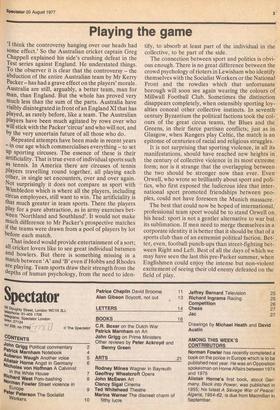Playing the game
`I think the controversy hanging over our heads had some effect.' So the Australian cricket captain Greg Chappell explained his side's crushing defeat in the Test series against England. He understated things. To the observer it is clear that the controversy — the abduction of the entire Australian team by Mr Kerry Packer — has had a grave effect on the players' morale. Australia are still, arguably, a better team, man for man, than England. But the whole has proved very much less than the sum of the parts. Australia have visibly disintegrated in front of an England XI that has played, as rarely before, like a team. The Australian Players have been much agitated by rows over who Will stick with the Packer 'circus' and who will not, and by the very uncertain future of all those who do.
.Repeated attempts have been made in recent years in our age which commercialises everything — to set Up sporting circuses. The essence of these is their artificiality. That is true even of individual sports such as tennis. In America there are circuses of tennis Players travelling round together, all playing each Other, in single set encounters, over and over again. Not surprisingly it does not compare as sport with Wimbledon which is where all the players, including circus employees, still want to win. The artificiality is that much greater in team sports. There the players Play for a pure abstraction, as in army exercises between 'Northland and Southland'. It would not make Much difference to Mr Packer's prospective matches if the teams were drawn from a pool of players by lot before each match.
That indeed would provide entertainment of a sort; all cricket lovers like to see great individual batsmen and bowlers. But there is something missing in a match between 'A' and 13' even if Hobbs and Rhodes are playing. Team sports draw their strength from the depths of human psychology, from the need to iden
"allaftwar
tify, to absorb at least part of the individual in the collective, to be part of the side.
The connection between sport and politics is obvious enough. There is no great difference between the crowd psychology of rioters in Lewisham who identify themselves with the Socialist Workers or the National Front and the rowdies which that unfortunate borough will soon see again wearing the colours of Millwall Football Club. Sometimes the distinction disappears completely, when ostensibly sporting loyalties conceal other collective instincts. In seventh. century Byzantium the political factions took the col-'. ours of the great circus teams, the Blues and the Greens, in their fierce partisan conflicts; just as in Glasgow, when Rangers play Celtic, the match is an epitome of centuries of racial and religious struggles. •
It is not surprising that sporting violence, in all its manifestations, should have reached new heights in the century of collective violence in its most extreme form; nor is it strange that the overlapping between the two should be stronger now than ever. Even Orwell, who wrote so brilliantly about sport and politics, who first exposed the ludicrous idea that international sport promoted friendships between peoples, could not have foreseen the Munich massacre.
• The best that could now be hoped of international, professional team sport would be to stand Orwell on his head: sport is not a gentler alternative to war but its sublimation. If men need to merge themselves in a corporate identity it is better that it should be that of a sports club than of an extremist political faction. Bet. ter, even, football punch-ups than street-fighting between Right and Left. Best of all the days of which we may have seen the last this pre-Packer summer, when Englishmen could enjoy the intense but non-violent excitement of seeing their old enemy defeated on the field of play.































 Previous page
Previous page